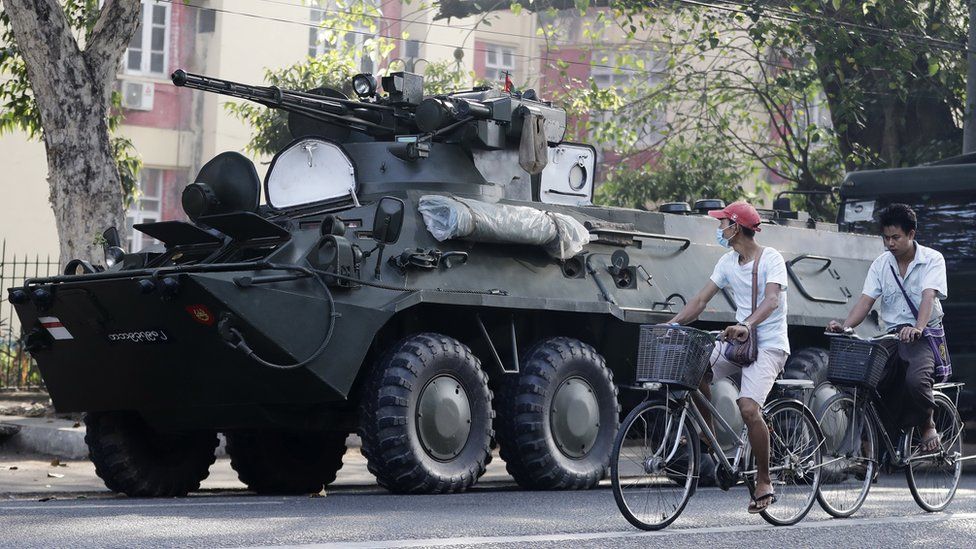The Burmese military is forcing people from their homes.
Needed: A return to democratic governance in Burma and an end to the Western-enabled violence!
Action Corps and allied organizations are calling on U.S. senators to support S.Res.20 for a return to democratic governance in Burma and an end to the violent military coup. Since the February 1st, 2021 coup, the Burmese military has engaged in mass atrocities such as detaining over 13,000 people for exercising basic freedoms, and killing over 2,800 civilians, including children. The people of Burma have seen increased human rights violations and militarization, and the situation is growing dire with each passing day. Over 17 million people are in need of humanitarian aid, and 1.5 million remain internally displaced due to the ongoing violence and instability.
Given the Burmese military’s unrelenting violence, Congress must act now to support the people of Burma. Senate Resolution 20, or S.Res.20, condemns the coup and calls for an immediate and unconditional release of those detained, as well as a return to democratic governance. The resolution helps build pressure on the Biden administration to match actions with words when it comes to human rights in Burma.
Please urge your members of Congress to stand in solidarity with the people of Burma, and support S.Res.20 to end the junta’s campaign of violence and cycle of impunity.
Today, tell your U.S. Senators to support S.Res.20!
Given the Burmese military’s unrelenting violence, Congress must act now to support the people of Burma. Senate Resolution 20, or S.Res.20, condemns the coup and calls for an immediate and unconditional release of those detained, as well as a return to democratic governance. The resolution helps build pressure on the Biden administration to match actions with words when it comes to human rights in Burma.
Please urge your members of Congress to stand in solidarity with the people of Burma, and support S.Res.20 to end the junta’s campaign of violence and cycle of impunity.
Today, tell your U.S. Senators to support S.Res.20!
Background on the Crisis:
Hear more about our work for a democratic Myanmar from our Action Corps team in the above podcast.
Burma is experiencing a military coup under a genocidal military. As a result, more than thousands of people have been killed. Many more individuals have been arbitrarily arrested and imprisoned.
Burma is home to 135 officially recognized ethnic groups and has previously experienced a coup followed by dictatorship rule from 1988 to 2011. The country remained largely unknown to the rest of the world until it began to democratize from 2011 until the Myanmar military attempted another coup.
While international attention focuses mainly on the Rohingya Genocide, it must be understood that issues must be approached from an all-inclusive viewpoint that voices the concerns of all ethnic minorities within Burma. Ethnic minorities all across Burma have been subjected to persecution for more than seventy years. Crimes against humanity, human rights violations, and war crimes committed by the Burma Army continue to hurt Burma’s ethnic groups, including the Kachin, Shan, Karen, Karenni, Mon, Rakhine, Chin, and more.
Where did the conflict start?
Many of the mass atrocities and human rights abuses witnessed today can be attributed to the unstable foundations of Burma’s independence in 1948 and pre-existing ethnic tensions that were aggravated by British colonialism. To achieve independence from British rule, General Aung San negotiated with and brought together many different ethnic groups under the Panglong Agreement in 1947 to create a Burmese Union. He was, however, assassinated. The death of a founding leader, the struggle to create a unified national identity, and the chase for power by Burmese officials have set the country up for countless mass atrocities, human rights abuses, and war crimes in the continuation of the longest civil war in the world.
What has the UN found?
The UN has listed six top military figures in Myanmar who must be investigated for genocide in Rakhine state and crimes against humanity in other areas.Crimes documented in Kachin, Shan and Rakhine include murder, imprisonment, torture, rape, sexual slavery, persecution and enslavement that "undoubtedly amount to the gravest crimes under international law". The report also found elements of extermination and deportation "similar in nature, gravity and scope to those that have allowed genocide intent to be established in other contexts".
Myanmar's army is accused of a systematic campaign of ethnic cleansing. Under the constitution, civilian authorities have little control over the military but the document says that "through their acts and omissions, the civilian authorities have contributed to the commission of atrocity crimes".
Burma is home to 135 officially recognized ethnic groups and has previously experienced a coup followed by dictatorship rule from 1988 to 2011. The country remained largely unknown to the rest of the world until it began to democratize from 2011 until the Myanmar military attempted another coup.
While international attention focuses mainly on the Rohingya Genocide, it must be understood that issues must be approached from an all-inclusive viewpoint that voices the concerns of all ethnic minorities within Burma. Ethnic minorities all across Burma have been subjected to persecution for more than seventy years. Crimes against humanity, human rights violations, and war crimes committed by the Burma Army continue to hurt Burma’s ethnic groups, including the Kachin, Shan, Karen, Karenni, Mon, Rakhine, Chin, and more.
Where did the conflict start?
Many of the mass atrocities and human rights abuses witnessed today can be attributed to the unstable foundations of Burma’s independence in 1948 and pre-existing ethnic tensions that were aggravated by British colonialism. To achieve independence from British rule, General Aung San negotiated with and brought together many different ethnic groups under the Panglong Agreement in 1947 to create a Burmese Union. He was, however, assassinated. The death of a founding leader, the struggle to create a unified national identity, and the chase for power by Burmese officials have set the country up for countless mass atrocities, human rights abuses, and war crimes in the continuation of the longest civil war in the world.
What has the UN found?
The UN has listed six top military figures in Myanmar who must be investigated for genocide in Rakhine state and crimes against humanity in other areas.Crimes documented in Kachin, Shan and Rakhine include murder, imprisonment, torture, rape, sexual slavery, persecution and enslavement that "undoubtedly amount to the gravest crimes under international law". The report also found elements of extermination and deportation "similar in nature, gravity and scope to those that have allowed genocide intent to be established in other contexts".
Myanmar's army is accused of a systematic campaign of ethnic cleansing. Under the constitution, civilian authorities have little control over the military but the document says that "through their acts and omissions, the civilian authorities have contributed to the commission of atrocity crimes".

